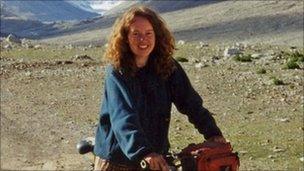Linda Norgrove wins Robert Burns Humanitarian Award
- Published

Linda Norgrove was kidnapped in an ambush and died weeks later, during a rescue attempt
Scottish aid worker Linda Norgrove has been announced as the winner of the 2011 Robert Burns Humanitarian Award.
The 36-year-old aid worker, from Lewis, was kidnapped in Afghanistan and died during a failed rescue attempt in October last year.
Her father John Norgrove received the award on her behalf at the Burns Birthplace Museum in Alloway, Ayrshire.
Scotland's Culture Minister Fiona Hyslop said Ms Norgrove worked to improve conditions for Afghan people.
She said: "Promoting tolerance and a shared humanity were of course themes that Robert Burns so often explored.
"Linda Norgrove clearly shared these values and through her work made a powerful difference in developing countries around the world."
From 2005 to 2009 Linda Norgrove worked with the UN on environmentally sustainable development projects in Afghanistan.
After a brief spell working in Laos, she returned to Afghanistan in February 2010 as regional director for American-based aid organisation, Development Alternatives Inc (DAI).
'Passionate woman'
At the time of her kidnapping, Ms Norgrove was working on the development of agricultural projects in unstable areas of Afghanistan's Kunar province.
Graham Peterkin, chairman of the 2011 Burns Humanitarian Award judging panel, said: "The Norgrove family should be very proud of this brave and passionate woman who paid the ultimate sacrifice to help others - she was a true humanitarian and a very worthy recipient of this year's award."
Magnus MacFarlane-Barrow, founder of Scottish-based charity Mary's Meals, which provides food and education for poverty-stricken children and communities across Latin America, Asia, Africa and Europe, was also nominated for the award.
The third nominee was Madhu Pandit Dasa, founder and chairman of the Akshaya Patra Foundation, one of the world's largest school meal programmes.
The winner of the award receives 1,759 guineas, a sum which signifies the year of the bard's birth and the coinage then in circulation, as well as a specially-commissioned hand-made award.
- Published28 December 2010
- Published6 December 2010
- Published2 December 2010